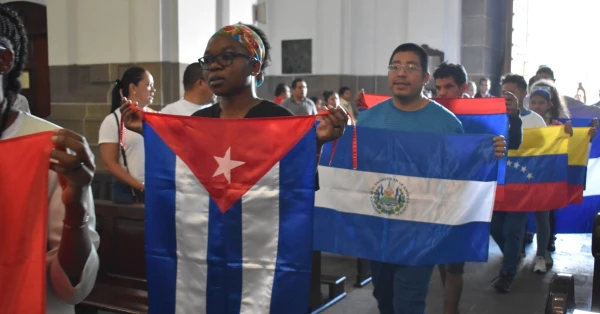Mons. Carlos Enrique Herrera, President of the Episcopal Conference of Nicaragua, presided over the Metropolitan Cathedral of Guatemala for the 111st World Migrant and Refugee Day, attended by migrants from different countries.
The bishop of Jinotega was expelled by the dictatorship of Daniel Ortega and Rosario Murillo in Nicaragua in November 2024, after criticizing a mayor related to the regime who put music at full volume outside the cathedral, interrupting the Mass.
Receive the main news of ACI Press by WhatsApp and Telegram
It is increasingly difficult to see Catholic news on social networks. Subscribe to our free channels today:

Mons. Herrera was one of Nicaragua’s bishops who met Pope Leo XIV in the Vatican on August 23. The other two, exiled like him, were Mons. Silvio Báez, auxiliary bishop of Managua, and Mons. Isidoro Mora, bishop of Siuna.
With Mons. Rolando Álvarez, Bishop of Matagalpa and Apostolic Administrator of Estelí, there are four exiled bishops of Nicaragua. The other five Nicaraguan bishops are still in the country.
The Mass on Sunday, September 28was preceded by the reading of a statement from the Human Mobility Pastoral of the Guatemala Episcopal Conference, which was followed by a gastronomic festival.
In the Eucharist, the Nicaraguan Bishop highlighted in his homily that the prophet Amós denounces the injustices of his people because “he cannot bear the attitude of the rulers, political leaders, some religious and businessmen of his time that results in a social division. The rich on the one hand and the poor marginalized and slaves on the other. A bad future. ”
For his part, the prelate continued, “St. Paul urges Timothy to promote in the community the great Christian values such as: justice, fraternity, the common good and charity for the most needy brothers.”
On the Gospel of Lázaro and the rich Epulon who banished daily, Bishop Herrera said that “the rich seem unable to receive the assets of the kingdom because they are attached to material things. The poor often appear more open to God, because they listen to their word and expect divine help.”
“Lázaro represents the shout of the poor in the time of Jesus and all time,” he added.
The bishop also commented that the parable shows what happened at that time, “but it is also a mirror of what happens today! The parable is like a window that Jesus opens to us towards the other side of life, the side of God. It is about the true side of life discovered only by faith, that the rich without faith does not perceive. The dominant ideology prevents it.”
With Lázaro, the prelate stressed, “God comes to us in the person of the poor, sitting at our door to help us overcome the unsurpassed abyss created by the rich heartless.”
Diego López Colín, ACI Press correspondent in Mexico collaborated with this note
